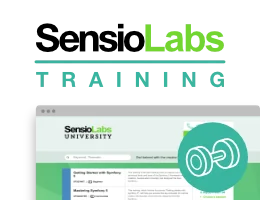Using webpack-dev-server and HMR
While developing, instead of using npx encore dev --watch, you can use the
webpack-dev-server:
1
$ npm run dev-serverThis builds and serves the front-end assets from a new server. This server runs at
localhost:8080 by default, meaning your build assets are available at localhost:8080/build.
This server does not actually write the files to disk; instead it serves them from memory,
allowing for hot module reloading.
As a consequence, the link and script tags need to point to the new server.
If you're using the encore_entry_script_tags() and encore_entry_link_tags()
Twig shortcuts (or are processing your assets through entrypoints.json
in some other way), you're done: the paths in your templates will automatically point to the dev server.
dev-server Options
The dev-server command supports all the options defined by webpack-dev-server.
You can set these options via command line options:
1
$ npm run dev-server -- --port 9000You can also set these options using the Encore.configureDevServerOptions()
method in your webpack.config.js file:
1 2 3 4 5 6 7 8 9 10 11 12 13 14 15 16
// webpack.config.js
// ...
Encore
// ...
.configureDevServerOptions(options => {
options.server = {
type: 'https',
options: {
key: '/path/to/server.key',
cert: '/path/to/server.crt',
}
}
})
;Enabling HTTPS using the Symfony Web Server
If you're using the Symfony web server locally with HTTPS, you'll need to also tell the dev-server to use HTTPS. To do this, you can reuse the Symfony web server SSL certificate:
1 2 3 4 5 6 7 8 9 10 11 12 13 14 15
// webpack.config.js
// ...
+ const path = require('path');
Encore
// ...
+ .configureDevServerOptions(options => {
+ options.server = {
+ type: 'https',
+ options: {
+ pfx: path.join(process.env.HOME, '.symfony5/certs/default.p12'),
+ }
+ }
+ })Note
If you are using Node.js 17 or newer and dev-server fails to start with TLS error,
the certificate file might be generated by an old version of symfony-cli. Upgrade
symfony-cli to the latest version, delete the old ~/.symfony5/certs/default.p12 file,
and start symfony server again.
This generates a new default.p12 file suitable for use with recent Node.js versions.
CORS Issues
If you experience issues related to CORS (Cross Origin Resource Sharing), set the following option:
1 2 3 4 5 6 7 8 9 10 11
// webpack.config.js
// ...
Encore
// ...
.configureDevServerOptions(options => {
options.allowedHosts = 'all';
// in older Webpack Dev Server versions, use this option instead:
// options.firewall = false;
})Beware that this is not a recommended security practice in general, but here it's required to solve the CORS issue.
Hot Module Replacement HMR
Hot module replacement is a superpower of the dev-server where styles and
(in some cases) JavaScript can automatically update without needing to reload
your page. HMR works automatically with CSS (as long as you're using the
dev-server and Encore 1.0 or higher) but only works with some JavaScript
(like Vue.js).
Live Reloading when changing PHP / Twig Files
To utilize the HMR superpower along with live reload for your PHP code and templates, set the following options:
1 2 3 4 5 6 7 8 9 10 11 12 13 14 15
// webpack.config.js
// ...
Encore
// ...
.configureDevServerOptions(options => {
options.liveReload = true;
options.static = {
watch: false
};
options.watchFiles = {
paths: ['src/**/*.php', 'templates/**/*'],
};
})The static.watch option is required to disable the default reloading of
files from the static directory, as those files are already handled by HMR.
1.0.0
Before Encore 1.0, you needed to pass a --hot flag at the command line
to enable HMR. You also needed to disable CSS extraction to enable HMR for
CSS. That is no longer needed.

